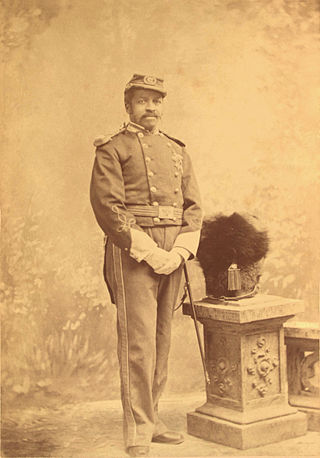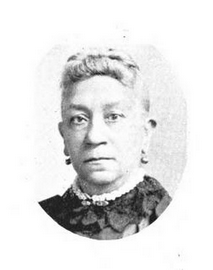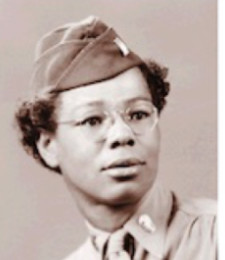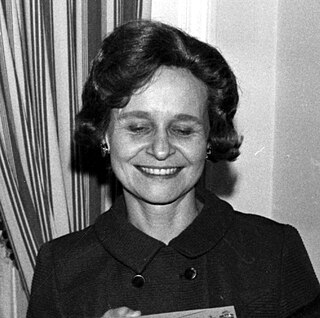
Mary Church Terrell was one of the first African-American women to earn a college degree, and became known as a national activist for civil rights and suffrage. She taught in the Latin Department at the M Street School —the first African American public high school in the nation—in Washington, DC. In 1895, she was the first African-American woman in the United States to be appointed to the school board of a major city, serving in the District of Columbia until 1906. Terrell was a charter member of the National Association for the Advancement of Colored People (1909) and the Colored Women's League of Washington (1892). She helped found the National Association of Colored Women (1896) and served as its first national president, and she was a founding member of the National Association of College Women (1923).

Christian Abraham Fleetwood, was an African American non-commissioned officer in the United States Army, a commissioned officer in the D.C. National Guard, an editor, a musician, and a government official. He received the Medal of Honor for his actions during the American Civil War.
Florence Elizabeth Riefle Bahr was an American artist and activist. She made portraits of children and adults, including studies of nature as she found it. Instead of using a camera, more than 300 pen and ink sketchbooks catalog insights into her life, including her civil and human rights activism of the 1960s and 1970s. One of the many important captured events included the Washington D.C. event where Martin Luther King Jr. first gave his I Have a Dream speech. Her painting Homage to Martin Luther King hangs in the (NAACP) National Association for the Advancement of Colored People's headquarters. She created illustrations for children's books and painted a mural in the Works Progress Administration (WPA) for the Johns Hopkins Hospital's Harriet Lane Home for Children. Her works have been exhibited in solo and group exhibitions since the 1930s. In 1999, she was posthumously awarded to the State of Maryland's Women's Hall of Fame, as the first woman artist they recognized.

George Washington Williams was a soldier in the American Civil War and in Mexico before becoming a Baptist minister, politician, lawyer, journalist, and writer on African-American history.
The Association of the Oldest Inhabitants of the District of Columbia (AOI) is the oldest civic organization in Washington, D.C., representing long-term citizens of the city. The association is dedicated to the District's history and heritage as well as promoting ideas to improve the future of Washington for its residents.

Sarah Jane Woodson Early, born Sarah Jane Woodson, was an American educator, black nationalist, temperance activist and author. A graduate of Oberlin College, where she majored in classics, she was hired at Wilberforce University in 1858 as the first black woman college instructor, and also the first black American to teach at a historically black college or university (HBCU).

Barbara Jeanne Fields is an American historian. She is a professor of American history at Columbia University. Her focus is on the history of the American South, 19th century social history, and the transition to capitalism in the United States.

Samuel Penniman Bates was an American educator, author, and historian. He is known for his reference works on the American Civil War, including his multi-volume History of Pennsylvania Volunteers, 1861–1865 which remains a frequently-used, preliminary research resource due to its narrative descriptions of unit activities and rosters of the regiments raised in the Commonwealth of Pennsylvania.

Normal School for Colored Girls established in Washington, D.C., in 1851 as an institution of learning and training for young African-American women, especially to train teachers.

Clayborne Carson is an American academic who is a professor of history at Stanford University and director of the Martin Luther King, Jr., Research and Education Institute. Since 1985, he has directed the Martin Luther King Papers Project, a long-term project to edit and publish the papers of Martin Luther King Jr.

Martha Settle Putney was an American educator and historian who chronicled the roles of African Americans in the armed forces. After serving as one of the first black members of the Women's Army Corps during World War II, she devoted her life to researching and documenting the military service and achievements of black Americans.

May Howard Jackson was an African American sculptor and artist. Active in the New Negro Movement and prominent in Washington, D.C.'s African American intellectual circle in the period 1910-30, she was known as "one of the first black sculptors to...deliberately use America's racial problems" as the theme of her art. Her dignified portrayals of "mulatto" individuals as well as her own struggles with her multiracial identity continue to call for the interpretation and assessment of her work.

Evelyn Brooks Higginbotham is a professor of Afro-American Studies, African American Religion and the Victor S. Thomas Professor of History and African American Studies at Harvard University. Higginbotham wrote Righteous Discontent: The Women's Movement in the Black Baptist Church: 1880–1920, which won several awards. She has also received several awards for her work, most notably the 2014 National Humanities Medal.

Virginia Cardwell Purdy was an American archivist and historian at the National Archives and Records Administration (NARA). She was a Fellow of the Society of American Archivists and an editor of the journal The American Archivist (1978–1980).

John Wesley Cromwell was a lawyer, teacher, civil servant, journalist, historian, and civil rights activist in Washington, D.C. He was among the founders of the Bethel Literary and Historical Society and the American Negro Academy, both based in the capital. He worked for decades in administration of the US Post Office.
James Dent Walker of Washington, DC was a genealogist, researcher, lecturer, teacher, and archivist known for his research in African American genealogy. He has written and lectured extensively on black genealogy and consulted many historical and genealogical organizations.
E. Belle Mitchell Jackson was an American educator, activist, small business owner, and abolitionist from Danville, Kentucky. Mitchell was one of the founders of the Colored Orphans Industrial Home in Lexington, Kentucky.

Ruth Evelyn Hodge is an American archivist, author, educator, and community activist who has furthered the advancement of African-American and United States military history research and writing during the 20th and early 21st centuries. "African-Americans played a great part in building America," she said during a newspaper interview in 2000. "The more people know, the better they understand and the better they get along."
Dr. Walter B. Hill Jr. was a scholar, historian and archivist. He worked with the Smithsonian and the National Archives for 30 years and wrote and edited for many academic journals. He was an advocate of diversity in archives and specialized in African American history. He is most well known as the consulting historian for the film, Glory, which earned heavy praise on its historical accuracy. He was featured as a special speaker for several conferences and events throughout his career. He frequently appeared on C-SPAN to discuss historical topics and controversies, especially topics pertaining to the American Civil War, African American history, and slavery.

Ida E. Jones is an American historian and author who is the University Archivist at Morgan State University, the first archivist in the university's history.















